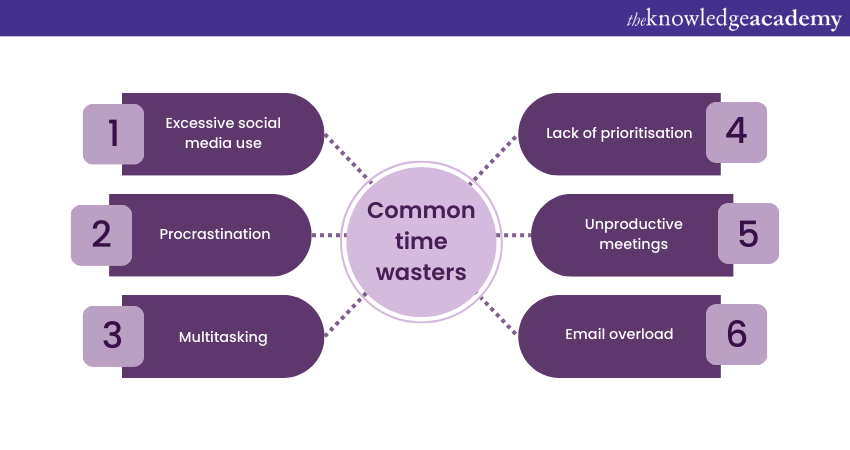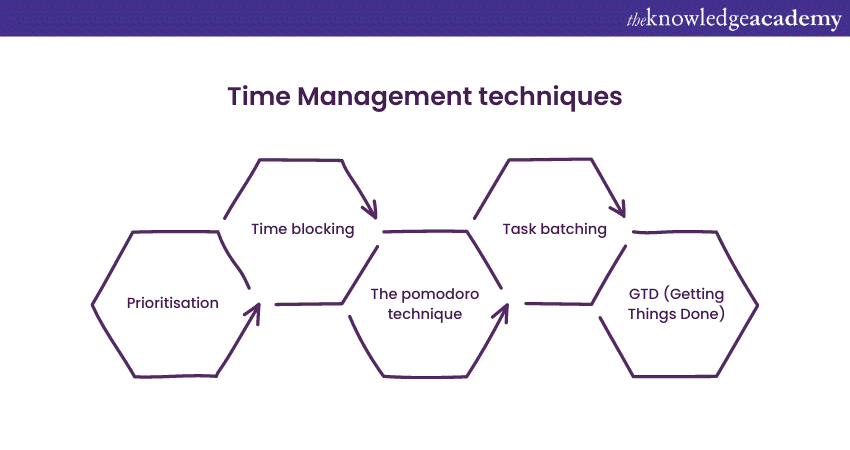We may not have the course you’re looking for. If you enquire or give us a call on 01344203999 and speak to our training experts, we may still be able to help with your training requirements.
Training Outcomes Within Your Budget!
We ensure quality, budget-alignment, and timely delivery by our expert instructors.

In a world where time waits for no one, mastering the art of Time Management is paramount. We often find ourselves caught up in tasks, commitments, and distractions, leaving us wondering where the hours went. That's where the crucial role of Time Management Statistics comes into play as this data helps change the way we handle tasks on a daily basis.
Understanding the significance of effective Time Management is the initial step towards regaining control of our lives. It's not merely a skill but a transformative tool that can reshape our productivity, enhance our well-being, and ultimately define our success.
In this blog on Time Management Statistics, we explore the numbers, patterns, and insights surrounding Time Management. From the workplace to personal life, from the psychology behind Time Management to the tools that aid it, we'll navigate the data-driven landscape of Time Management.
Table of Contents
1) Overview of Time Management Statistics
2) Time Management in the workplace
3) Time Management in personal life
4) Common time wasters
5) Time Management techniques
6) Conclusion
Overview of Time Management Statistics
Time Management is the cornerstone of personal and professional success. To understand its significance in the current fast-paced world, we must examine the current landscape of Time Management Statistics as we explore the various aspects that shed light on how people manage their time and why it's more crucial than ever.
First, let's focus on Time Management Statistics. These numbers encompass a wide range of data, from how people allocate their time daily to the impact of effective Time Management on their lives. By analysing these statistics, we can discern trends and insights that help us gauge the overall state of Time Management.

Time Management in the workplace
Efficient Time Management is a linchpin for success in the professional space. In a fast-paced and competitive work environment, how individuals manage their time can significantly impact their productivity and overall job satisfaction. Let us go over factors that focus on various aspects of Time Management within the workplace, offering insights and Time Management Statistics of professional life.
1) Statistics on workplace productivity: Workplace productivity is intrinsically tied to Time Management. Understanding how employees utilise their time can provide valuable insights for businesses. Time Management Statistics related to productivity, includes data on average work hours, time spent on specific tasks, and the impact of effective Time Management on overall job performance.
2) The impact of poor Time Management on businesses: Inefficient Time Management affects individual employees and can have far-reaching consequences for businesses. Examining the statistics highlighting the detrimental effects of poor Time Management on organisations, such as increased operational costs, missed deadlines, and decreased employee morale. These insights underscore the critical role of effective Time Management in achieving business goals.
3) Time Management training and programs: Many companies recognise the importance of Time Management in maintaining a competitive edge. As a result, they invest in Time Management training programs for their employees. The prevalence of such programs, their effectiveness, and the impact they have on employee performance, productivity, and job satisfaction helps in enhanced overall Time Management.
4) Remote work and Time Management: The rise of remote work has introduced new dynamics into Time Management. With flexible work arrangements, employees must often navigate the challenges of setting boundaries between work and personal life.
5) Strategies for effective Time Management at work: No discussion of Time Management in the workplace is complete without exploring practical strategy. Proven Time Management techniques that professionals can implement to boost their productivity and manage their workload efficiently include strategies such as task prioritisation, goal setting, and methods for minimising workplace distractions.
Time Management in personal life
Time Management isn't confined to the workplace; it extends its influence to every aspect of our personal lives. The ability to make the most of our time outside of work profoundly impacts our overall well-being and the pursuit of our individual goals. Let us explore how Time Management principles apply to personal life, supported by relevant Time Management Statistics.
1) How Time Management affects personal goals: Personal Time Management is about aligning daily activities with one's aspirations and objectives. The role of effective Time Management in achieving personal goals, whether they involve health and fitness, education, hobbies, or personal development is crucial. Time Management Statistics illustrates the correlation between well-structured personal time and goal attainment.
2) Balancing work and personal life: A healthy work-life balance is a vital concern for many individuals. Adapting Time Management can facilitate this balance by helping individuals allocate time to their careers, family, social life, and personal interests. Relevant Time Management Statistics will highlight people's challenges in achieving this equilibrium.
3) Statistics on the benefits of effective personal Time Management: Effective personal Time Management isn't just about getting more done; it's about enhancing overall quality of life. Time Management Statistics demonstrating the various benefits of effective Time Management in personal life, including reduced stress levels and increased leisure time.
4) Mindfulness and Time Management: Mindfulness practices have gained popularity as tools for enhancing Time Management. Mindfulness techniques, such as meditation and mindfulness-based Time Management, can help individuals become more aware of how they spend their time and make intentional choices. Time Management Statistics reveals the growing adoption of these practices.
5) Time Management for personal well-being: Well-being encompasses various aspects, including physical, mental, and emotional well-being. Personal Time Management can contribute to well-being by allowing individuals to prioritise self-care activities, stress management, and relaxation. Time Management Statistics will underline the positive impact on well-being.
Acquire skills to set target and achieve goals, sign up for our Attention Management Training now!
Common time wasters
Effective Time Management requires identifying and mitigating everyday time-wasting activities. These insidious distractions and habits can silently consume valuable hours if left unchecked. By recognising and addressing these common time wasters, individuals can free up time for more productive and fulfilling endeavours. Here are some of the most prevalent culprits:

a) Excessive social media use: The allure of social media is undeniable, but it can be a significant time sink. Scrolling through newsfeeds, watching endless videos, and responding to notifications can devour hours daily. According to Time Management Statistics, the average person spends most of their day on social media platforms. Setting limits and using time-tracking apps can help curb this habit.
b) Procrastination: Procrastination delays tasks or decisions caused mainly by the absence of motivation or fear of failure. It's a notorious time waster that can lead to stress and missed opportunities. Individuals can employ techniques like the Pomodoro method, task prioritisation, and setting specific deadlines to combat procrastination.
c) Multitasking: Contrary to popular belief, multitasking makes us less efficient. It can hinder productivity. Switching between tasks consumes cognitive resources and can lead to mistakes. Time Management studies indicate that focusing on one task at a time and using techniques like batching similar tasks can improve efficiency.
d) Lack of prioritisation: Not setting clear priorities can result in scattered efforts and time wasted on less important tasks. Creating a daily or weekly to-do list with ranked priorities can help individuals focus on what truly matters.
e) Unproductive meetings: Meetings can be a significant time drain if they need more structure and purpose. Many meetings run longer than necessary and veer off-topic. Employing techniques such as setting agendas and time limits and evaluating the necessity of each meeting can help reclaim lost time.
f) Email overload: Endless email checking and responding can disrupt workflow. Studies suggest that frequent email checking can decrease productivity. Establishing specific email checking intervals and using filters to prioritise important messages can help manage email effectively.
g) Overcommitting: Saying "yes" to too many commitments can spread individuals thin and give them little time for essential tasks. Learning to say "no" when necessary and setting realistic expectations can prevent over-committing.
h) Unstructured work environment: Organisation and clutter in the workspace can save time as individuals search for misplaced items or need help concentrating. Investing in decluttering and creating an organised workspace can yield significant time savings.
i) Perfectionism: Chasing perfection in every task can be paralysing and lead to unnecessary time spent on minor details. Embracing the concept of "good enough" and knowing when to move on can prevent perfectionism from becoming a time waste.
j) Mindless television or streaming: While relaxation is essential, excessive TV or streaming consumption can become a time-wasting habit. Setting boundaries and scheduling specific leisure time can help strike a balance.
Time Management techniques
Effective Time Management can be implemented and refined with proper techniques. These strategies empower individuals to optimise their time use, boost productivity, and reduce stress. Let's dive into some of the most popular and effective Time Management techniques:

a) Prioritisation: Prioritisation is the foundation of effective Time Management. It involves identifying tasks or goals based on their importance and urgency. The Eisenhower Matrix, a popular prioritisation tool, categorises tasks into four quadrants: urgent and important, important but not urgent, urgent but not important, and neither urgent nor important. This helps individuals focus on tasks that truly matter.
b) Time blocking: Time blocking is a technique where individuals allocate specific blocks of time to different tasks or activities. People can focus and prevent distractions by creating a structured schedule and dedicating set intervals to particular tasks.
c) The Pomodoro technique: This technique involves breaking work into intervals, typically 25 minutes each (known as "Pomodoros"), followed by a short break. After completing four Pomodoros, individuals take a longer break. This technique promotes focused work while allowing for regular rest.
d) Task batching: Task batching involves grouping similar tasks and completing them in one dedicated time block. For example, answering emails, making phone calls, or researching can be batched. This reduces context-switching and improves efficiency.
e) GTD (Getting Things Done): The GTD method, popularised by David Allen, emphasises capturing all tasks, organising them, and regularly reviewing and prioritising. By having a trusted system to track commitments, individuals can clear their mental clutter and stay on top of their responsibilities.
f) Eat the Frog: The "Eat the Frog" technique encourages individuals to handle their most challenging or unpleasant task first thing in the morning. By overcoming the most significant hurdle early, people can boost their motivation and productivity for the rest of the day.
g) Time Management apps and tools: Numerous digital tools and apps are designed to aid Time Management. These include calendar apps, task managers, and project management software. These tools help individuals efficiently plan, organise, and track their time and tasks.
h) The Two-minute Rule: The Two-Minute Rule, advocated by productivity expert David Allen, suggests that if a task can be finished in two minutes or less, it should be completed immediately rather than postponed. This prevents small tasks from accumulating and becoming overwhelming.
i) The 80/20 principle (Pareto principle): The 80/20 principle posits that approximately 80% of outcomes result from 20% of efforts. Time Management means focusing on the most impactful tasks and activities that yield the greatest results.
j) Goal setting and SMART goals: Setting clear, specific, measurable, achievable, relevant, and time-bound (SMART) goals are crucial for effective Time Management. It provides a roadmap and motivation for prioritising tasks aligned with these goals.
k) Time audit: Conducting a time audit involves tracking how one spends their time for a specific period. This reveals where time is being invested and highlights areas for improvement.
l) Delegate and outsource: Delegating tasks to others or outsourcing activities not within one's core competencies can free up valuable time and mental energy.
m) Mindfulness and Time Management: Mindfulness techniques, such as meditation and deep breathing, can enhance focus and reduce distractions, contributing to effective Time Management.
Learn how to plan and prioritise effectively, sign up for our Time Management Training today!
Conclusion
Effective Time Management is crucial in achieving professional success and maintaining personal well-being. Time Management Statistics support this notion. Armed with insights into the current state of Time Management, common time wasters, and powerful techniques, individuals can reclaim their most valuable resource, time, and unlock their full potential.
Learn workplace efficiency with core organisational skills, sign up for our Organisational Skills Training now!
Frequently Asked Questions
Upcoming Business Skills Resources Batches & Dates
Date
 Time Management Training
Time Management Training
Fri 24th May 2024
Fri 28th Jun 2024
Fri 26th Jul 2024
Fri 23rd Aug 2024
Fri 27th Sep 2024
Fri 25th Oct 2024
Fri 22nd Nov 2024
Fri 27th Dec 2024







 Top Rated Course
Top Rated Course


 If you wish to make any changes to your course, please
If you wish to make any changes to your course, please


